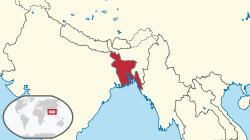This article has multiple issues. Please help improve it or discuss these issues on the talk page. (Learn how and when to remove these messages)
|
Provisional Government of the People's Republic of Bangladesh | |||||||||
|---|---|---|---|---|---|---|---|---|---|
| 1971–1972 | |||||||||
| Anthem: আমার সোনার বাংলা (Bengali) Amar Sonar Bangla "My Golden Bengal"[1] | |||||||||
 Areas claimed by the Provisional Government, present day Bangladesh | |||||||||
| Status | Government-in-exile | ||||||||
| Capital | Dacca (claimed) Mujibnagar | ||||||||
| Capital-in-exile | Calcutta | ||||||||
| Common languages | Bengali | ||||||||
| Demonym(s) | Bangladeshi | ||||||||
| Government | Unitary semi-presidential provisional government | ||||||||
| President | |||||||||
• 1971–1972 | Sheikh Mujibur Rahman | ||||||||
• 1971–1972 | Syed Nazrul Islam (interim)a | ||||||||
| Prime Minister | |||||||||
• 1971–1972 | Tajuddin Ahmad | ||||||||
| Legislature | None (de jure) Advisory Council (de facto)b | ||||||||
| Historical era | Bangladesh Liberation War | ||||||||
• Formation | 10 April 1971 | ||||||||
• Cabinet oath-taking | 17 April 1971 | ||||||||
• Taking of military and political responsibilities | 22 December 1971 | ||||||||
| 12 January 1972 | |||||||||
| Area | |||||||||
• Total | 148,460 km2 (57,320 sq mi) | ||||||||
| Currency | Bangladeshi taka | ||||||||
| ISO 3166 code | BD | ||||||||
| |||||||||
| Today part of | Bangladesh | ||||||||
a. Originally, Syed Nazrul Islam was the vice-president of the government, but worked as the interim president as Sheikh Mujibur Rahman was jailed in West Pakistan b. Highest decision making organ of the government. | |||||||||
Provisional Cabinet of Bangladesh | |
|---|---|
Cabinet of Bangladesh | |
 Sculpture of the cabinet members of the Provisional Government of Bangladesh at Mujibnagar | |
| Date formed | 10 April 1971 |
| Date dissolved | 12 January 1972 |
| People and organisations | |
| President |
|
| Prime minister | Tajuddin Ahmad |
| Member parties | Awami League |
| History | |
| Predecessor | East Pakistan |
| Successor | Second Sheikh Mujib cabinet |
| History of Bangladesh |
|---|
 |
|
|
The Provisional Government of Bangladesh (Bengali: অস্থায়ী বাংলাদেশ সরকার), popularly known as the Mujibnagar Government (মুজিবনগর সরকার, Mujibanagara Sarakāra); also known as the Bangladeshi government-in-exile,[2][3][4][5] was the first and founding government of Bangladesh that was established following the proclamation of independence of East Pakistan as Bangladesh on 10 April 1971. Headed by prime minister Tajuddin Ahmad, it was the supreme leadership of the Bangladeshi liberation movement, comprising a cabinet, a diplomatic corps, an assembly, an armed force, and a radio service. It operated as a government-in-exile from Kolkata.
After the 1970 general election, the military junta of Pakistan failed to hand over power to the elected legislators. When the Pakistan Army cracked down on the East Pakistani population, the elected political leadership of East Pakistan declared independence and founded the provisional government with the support of the Government of India. Its cabinet took oath on 17 April 1971 in the town of Mujibnagar. It attracted many defectors from the Pakistani civil, diplomatic and military services and many leading intellectuals and cultural figures from East Pakistan.
The Mujibnagar government coordinated the war efforts of the Mukti Bahini and the nascent Bangladesh Armed Forces. It had its own postal service.[6] Its public relations strategy featured a widely popular radio station known as Swadhin Bangla Betar Kendra. It coordinated with the Government of India in conducting the armed resistance against the Pakistan army and also addressing the refugee crisis. It also undertook an international campaign to garner support for Bangladesh's independence, calling for stopping the genocide and preventing a refugee crisis. It appointed special envoys and operated representative missions in New Delhi, Washington, D.C., and London among many other cities.
- ^ Farooq, AKM (2012). "National Anthem". In Sirajul Islam and Ahmed A. Jamal (ed.). Banglapedia: National Encyclopedia of Bangladesh (Second ed.). Asiatic Society of Bangladesh. Archived from the original on 4 October 2018. Retrieved 30 June 2019.
- ^ "Bangladesh 50 Timeline – the Road to Independence".
- ^ "Dec 18, 1971: Government's vanguard arrives in free Dhaka".
- ^ "The Liberation War and the Provisional Government". 26 March 2018.
- ^ "Bangladesh Provisional Government in Exile | the Asian Age Online, Bangladesh".
- ^ "Postal Administration of Mujibnagar Government". 21 August 2017.

